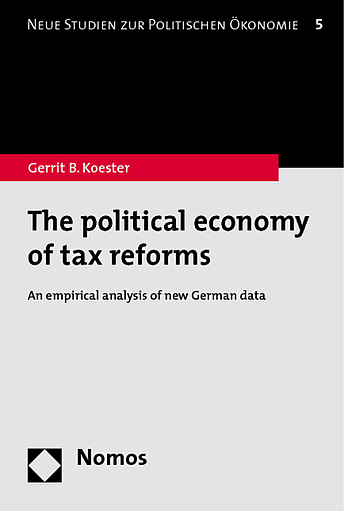englischWhat determines tax policy? What motivations do governments follow in tax reforms? Do voters react to tax reductions and tax increases? Based on a new data-set of the fiscal effects of tax reforms in Germany from 1964 to 2004, the book offers new insights on the pattern of tax reforms and test economic hypotheses of tax policy. It shows that normative approaches are largely unable to contribute to the explanation of tax reforms in Germany.
With respect to polit-economic theories the author finds that divided government matters, but in the opposite direction of the “gridlock-hypothesis”: tax reforms are larger and more frequent in times of divided government. He does not find evidence for partisan politics but for opportunistic behavior of governments. However, the governments’ attempts to manipulate re-election probabilities by tax reductions before elections largely fail: his analyses show that voters react strongly to tax burden changes but take the direction of tax reforms within the whole legislative period (and not just in election years) into account.
Was bestimmt die Steuerpolitik? Welche Ziele verfolgen die Bundesregierungen bei Steuerreformen? Haben Steuererhöhungen und Steuersenkungen einen Einfluss auf die Wahlergebnisse? Auf der Basis eines neuen Datensatzes zu den fiskalischen Effekten von Steuerreformen im Zeitraum von 1964 bis 2004 zeigt das Werk Muster der Steuerpolitik auf und testet zentrale ökonomische Hypothesen. Dabei zeigt sich, dass normative ökonomische Ansätze kaum einen Erklärungsbeitrag für die zu beobachtende Steuerpolitik leisten können.
Ausgehend von wichtigen polit-ökonomischen Theorien zeigt der Autor, dass die Mehrheitskonstellationen im Bundesrat einen wichtigen Einfluss auf die Steuerpolitik haben, allerdings genau umgekehrt wie von der Blockade-Hypothese behauptet: Steuerreformen sind gemessen an ihren Fiskaleffekten bei gegenläufigen Mehrheiten in Bundestag und Bundesrat häufiger und umfangreicher. Des Weiteren gibt es keine Hinweise darauf, dass die parteipolitische Zusammensetzung der Bundesregierung einen wichtigen Einfluss auf Steuerreformen hat. Wahltaktische Terminierungen von Steuerreformen spielen aber sehr wohl eine wichtige Rolle. Eine Auswertung des Zusammenhangs von Steuerreformen und Wahlergebnissen zeigt allerdings, dass die Versuche der Bundesregierungen, ihre Wiederwahlwahrscheinlichkeit durch Steuersenkungen kurz vor der Wahl zu erhöhen, wenig erfolgreich sind: Nicht nur die Jahre unmittelbar vor den Wahlterminen, sondern die Steuerpolitik in der gesamten Legislaturperiode hat einen Einfluss auf die Bundestagswahlergebnisse der regierenden Parteien.


